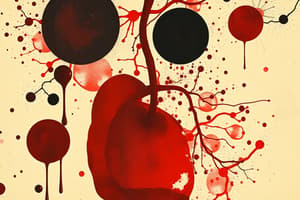Podcast
Questions and Answers
What is the primary function of red blood cells?
What is the primary function of red blood cells?
- Transporting hormones
- Defending against pathogens
- Carrying oxygen (correct)
- Producing platelets
Which component of blood helps in clotting when there is an injury?
Which component of blood helps in clotting when there is an injury?
- White blood cells
- Platelets (correct)
- Plasma
- Hormones
What is the main function of white blood cells in the body?
What is the main function of white blood cells in the body?
- Carry oxygen
- Regulate pH levels
- Provide nutrients to cells
- Defend against pathogens (correct)
What is the liquid part of blood that contains various proteins, salts, and enzymes called?
What is the liquid part of blood that contains various proteins, salts, and enzymes called?
In which part of the body can you find a higher concentration of platelets?
In which part of the body can you find a higher concentration of platelets?
How do red blood cells contribute to maintaining homeostasis in the body?
How do red blood cells contribute to maintaining homeostasis in the body?
What is one of the primary roles of blood, in addition to oxygen delivery and waste removal?
What is one of the primary roles of blood, in addition to oxygen delivery and waste removal?
How do some cells communicate with distant cells without physically touching each other?
How do some cells communicate with distant cells without physically touching each other?
What is the normal pH range in the body that blood helps maintain for proper function?
What is the normal pH range in the body that blood helps maintain for proper function?
What can disruptions in the body's pH balance potentially lead to?
What can disruptions in the body's pH balance potentially lead to?
Which component of the body's fluid system contains white blood cells known as lymphocytes?
Which component of the body's fluid system contains white blood cells known as lymphocytes?
How do lymph nodes contribute to the body's defense against intruders?
How do lymph nodes contribute to the body's defense against intruders?
Flashcards are hidden until you start studying
Study Notes
Body Fluids and Circulation
Your body is made up of various types of cells that require nutrients and oxygen to function properly. To deliver these essentials to your cells, your body uses specialized systems called body fluids and circulation. These systems help maintain homeostasis by balancing and distributing fluids within the body while also circulating blood throughout your organs and tissues. This process involves several key components, including blood and lymphatic fluid, which transport materials around your body and support vital functions like digestion and immune defense.
Blood Composition
Blood is one of the most important body fluids, responsible for delivering oxygen from your lungs to all parts of your body and carrying away waste products such as carbon dioxide. It consists mainly of red and white blood cells suspended in plasma—a liquid containing proteins, salts, enzymes, hormones, vitamins, minerals, and water. Red blood cells carry oxygen while white blood cells play a crucial role in defending against invading pathogens. Platelets are also present, helping with clotting when you get injured. All these elements work together to ensure healthy functioning of your body.
The composition of blood varies slightly among individuals due to factors such as age, sex, health status, dietary habits, exercise regimen, and environmental conditions. For example, pregnant women have more fluid and fewer platelets compared to non-pregnant women. However, despite these variations, the basic structure remains consistent across different people.
In addition to its primary roles in oxygen delivery and waste removal, blood also transports other molecules to where they're needed in your body. It delivers hormones to target cells and carries nutrients absorbed from food into your bloodstream. Some cells secrete hormones directly into the bloodstream, allowing them to communicate with distant cells without physically touching each other.
Moreover, blood plays a significant role in maintaining proper pH levels in your body. A normal pH range falls between 7.35 and 7.45, ensuring that your body can effectively absorb and utilize nutrients, prevent diseases, and optimize energy production. If this balance is disrupted, it could lead to acidemia or alkalosis, potentially causing serious complications if left untreated.
Lymphatic System and Immunity
Lymphatic fluid is another critical component of your body's fluid system. Derived from interstitial fluid, lymphatic fluid contains white blood cells known as lymphocytes that contribute to immunity. When foreign particles enter your body through cuts or wounds, lymph nodes filter out the debris and create antibodies called B cells, which defend against intruders. These white blood cells enable your body to recognize and destroy bacteria, viruses, fungi, parasites, cancer cells, and even damaged cells before they cause harm.
By understanding how different body fluids interact and distribute resources efficiently, we gain insights into our overall health and wellbeing. Proper nutrition and regular exercise help maintain optimal fluid balance, promoting good health. Maintaining hydration is especially important since dehydration affects every cell, organ, and tissue in your body. Therefore, staying informed about your body’s fluid dynamics can empower you to make better decisions regarding your lifestyle choices and healthcare needs.
Studying That Suits You
Use AI to generate personalized quizzes and flashcards to suit your learning preferences.





